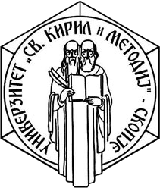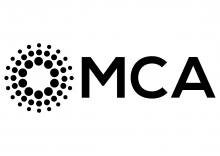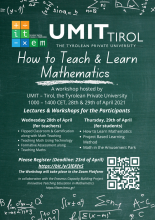Ecoinformatics (3+1+1)
1. General Information
Postgraduate studies in Ecoinformatics strive for top European education and training of staff, who after graduation will be able to meet the needs of industry.
- Name of the proposer: University "Ss. Cyril and Methodius University in Skopje, Faculty of Information Sciences and Computer Engineering - FINKI
- Name of the study program: academic second cycle studies in Ecoinformatics
- Scientific-research area: technical-technological
- Field: Computer Engineering & Informatics
- Area: eco-informatics
- The value of postgraduate studies is 60 ECTS or 120 ECTS credits .
- Duration of studies: 2 or 4 semesters .
- One academic year consists of two semesters lasting 30 weeks (1 semester = 15 weeks).
- The first semester consists of subjects, while the second has a smaller number of subjects and is reserved for the final project, ie. for the master's thesis.
- Admission Requirements : Completed undergraduate studies in the field of informatics or computer technology and informatics with a minimum of 240 credits. For study directions that carry less than 240 credits, exams offered in the introductory layer are added.
- Introductory layer : Students who have earned less than 240 credits during their studies are offered a set of differential introductory courses. After their successful realization, the student acquires the right to continue with the second year of postgraduate studies.
- First semester: 3 Mandatory courses and 2 electives, one of which may be from the University list.
- Second semester: 1 Mandatory and 1 elective, which can be from the university list (only if in the first semester the subjects are selected at the Faculty level) and a final project of 18 ECTS
- 1 ECTS credit corresponds to 30 hours of total work engagement
- The number of contact hours is 4
- The academic title or degree obtained after graduation is
- Master in Information Science and Computer Engineering in the field of Ecoinformatics
2. Introductory layer
The introductory layer is intended for students who study for less than four years or have earned less than 240 credits from previous studies.
Table 1: List of introductory layer items
| РБ | Subject | Semester | ECTS |
| 1 | Mandatory subject 1 of Table 2 | VII | 6 |
| 2 | Mandatory subject 2 of Table 2 | VII | 6 |
| 3 | Mandatory subject 3 of Table 2 | VIII | 6 |
| 4 | Mandatory subject 4 of Table 2 | VIII | 6 |
| 5 | Elective course 1 1 | VII | 6 |
| 6 | Elective 2 1 | VII | 6 |
| 7 | Elective course 3 1 | VII | 6 |
| 8 | Elective 4 1 | VIII | 6 |
| 9 | Elective course 5 1 | VIII | 6 |
| 10 | Selection from the university list of free courses | VIII | 6 |
[1] Selection from the lists of subjects from the introductory layer of all master studies at the Faculty of Information Technologyauki and computer engineering
Elective courses can be selected from the proposed list of courses of the study program, Table 2, or from the proposed lists of courses from the introductory layer of other study programs of the Faculty of Information Sciences and Computer Engineering. The choice of courses should be made in accordance with the previous knowledge of the candidate and the necessary knowledge to continue with the postgraduate studies in Internet technologies. Only one free choice of subject is allowed which is on the university list of subjects for the first year of two-year postgraduate studies.
Table 2: List of electives
| РБ | New Code / Subject | Semester | ECTS | Prerequisite2 | |
| 1 | CSEW501 Management Information Systems | VII | 6 | Software Engineering or Software Requirements Analysis | |
| 2 | CSEW702 Web based systems | VII | 6 | Web programming or Internet technologies | |
| 3 | CSEW303 Probability and Statistics | VII | 6 | Calculus 1, Discrete Mathematics 2 | |
| 4 | CSEW504 Network Services Administration | VII | 6 | Computer Networks, Operating Systems | |
| 5 | CSEW710 Research methodology in ICT | VII | 6 | no | |
| 6 | CSEW711 Modeling and Simulation | VIII | 6 | Probability and Statistics | |
| 7 | CSES606 Geographic Information Systems | VIII | 6 | Databases | |
| 8 | CSES622 Data Mining | VIII | 6 | Databases | |
| 9 | CSES805 Intelligent Information Systems | VIII | 6 | Machine learning | |
| 10 | CSEW517 Machine learning | VIII | 6 | Probability and Statistics or Business Statistics | |
[2] The titles of the courses are given according to the curricula of the undergraduate studies at the Faculty of Information Technologies and Computer Engineering, UKIM, Skopje. Students who have graduated from other institutions will have to show passed exams in subjects appropriate to the above in order to meet the prerequisites for the respective subject.
After the successful completion of all ten courses and 60 credits, the student with previously acquired 180 ECTS credits (or completed three-year studies) continues with the courses from the second academic year of postgraduate studies - Table 3 (IX and X semester).
3. Studies
Table 3: List of Postgraduate Courses
| РБ | CODE / Subject | Semester | З / И | ECTS |
| 1 | EI-Z-01 Concepts in Eco-informatics | IX | З | 6 |
| 2 | EI-02 Ecological modeling | IX | З | 6 |
| 3 | EI-Z-03 Implementation of Geographic Information Systems | IX | З | 6 |
| 4 | Elective course 1 | IX | И | 6 |
| 5 | Elective 2 | IX | И | 6 |
| 6 | EI-Z-04 Knowledge Discovery in Environmental data | X | З | 6 |
| 7 | Elective course 3 | X | И | 6 |
| 8 | Master Thesis | X | З | 18 |
At least one elective should be chosen from the offered electives in Table 4. At most one of the electives can be chosen from the University list of master's degree programs. A maximum of two electives can be selected from the courses offered at the other postgraduate studies at the Faculty of Information Sciences and Computer Engineering.
Table 4: Electives
| РБ | New Code / Subject | Semester | ECTS | |
| 1 | EI-I-01 Requirements Analysis in Ecosystem informatics | IX | 6 | |
| 2 | EI-I-02 Monitoring and data processing in environmental engineering | IX | 6 | |
| 3 | EI-I-03 Remote sensing | X | 6 | |
| 4 | ЕИ-И-04 E-business | IX | 6 | |
| 5 | ЕИ-И-05 Data visualization | IX | 6 | |
| 6 | ЕИ-И-06 Digital Marketing | X | 6 | |
| 7 | EI-I-07 Advanced Distributed and Parallel Systems | IX | 6 | |
| 8 | EI-I-08 Internet Infrastructure Management | IX | 6 | |
| 9 | ЕИ-И-09 Smart Sensor Networks | X | 6 | |
| 10 | IT-I-10 Network Virtualization and Cloud Computing | X | 6 | |
| 11 | IT-I-11 Data Science | IX | 6 | |
| 12 | IS-I-04 Mobile web services | IX | 6 | |
| 13 | PS-I-08 Linked Open Data | X | 6 | |
| 14 | PS-I-07 IoT for Environmental Systems | IX | 6 | |
The student can choose a subject from the list of offered elective courses from all study programs of the second cycle of studies. The list of offered electives can be found on this link .




